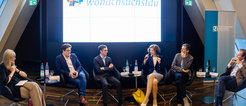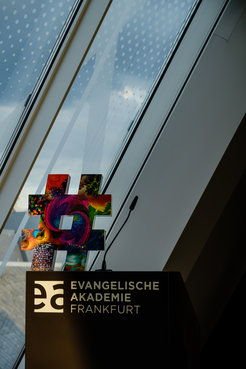#wonachsuchstdu: Max Planck Day 2018

This year marks the 160th birthday of Max Planck and the 100th anniversary of his being awarded the Nobel Prize for Physics. Moreover, the Max Planck Society was founded precisely 70 years ago – certainly good enough reasons to celebrate a very special Max Planck Day. On 14 September, the Max Planck Society celebrated a nationwide festival of science: in 32 German cities, Max Planck Institutes presented their research to the public by opening their doors and offering a wide variety of events.

For this reason, five directors from Frankfurt’s Max Planck Institutes met in the Panorama Hall of the Protestant Academy for a public discussion of the day’s hashtag #wonachsuchstdu (meaning: what are you looking for?). Under the theme 'Between Theory and Experiment – Perspectives of Fundamental Research in Frankfurt', the panel discussion was opened by Patrick Burghardt, Secretary of State in Hessia’s Ministry for Science and Art. The evening was moderated by Dr. Regina Oehler, scientific editor at Hessia Radio; her questions attempted to give the audience a better idea of the research focusses of the individual institutes, for example, how densely wired is our brain? Why do some melodies sound so off-key? What are designer cells good for? How does one investigate European legal history from a global perspective?
Dr Melanie Wald-Fuhrmann (MPI for Empirical Aesthetics), Dr Thomas Duve (MPI for European Legal History), Dr Gerhard Hummer (MPI for Biophysics), Dr Moritz Helmstaedter (MPI for Brain Research) and Dr Pascal Fries (Ernst Strüngmann Institute for Neuroscience) highlighted the relationship between theory and experiment or empirical studies, showing some surprising parallels between research in the natural sciences, musicology and legal history. On the topic of the internationality of fundamental research, all of the participants contributed personal experiences and views. Some of them had been recruited from foreign institutions to take up directorships in Frankfurt, and all of them work in and with international research teams. They also touched upon the great freedom Max Planck directors enjoy when it comes to setting their own research agendas as well as the great level of responsibility accompanying this scientific independence—two factors essential to carrying out cutting-edge research.
The discussion was recorded and will be broadcast by Hessia Radio (Hessischer Rundfunk) in its programme "Kulturszene" on 20 October 2018.

